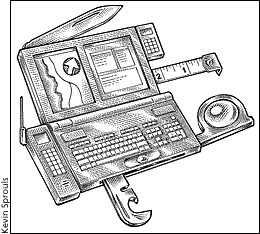The Words of Tomorrow
A glossary of terms you'll need to
know
By RACHEL EMMA
SILVERMAN
Words will matter.
As we enter the digital-virtual-cyber-whatever era, words remain the raw
material of organized life, the stuff of e-mail, voice mail and cell-phone
messages, to say nothing of our lists, notes, memos and sundry other
missives. And when at last we wind up meeting face to face, we must once
again resort to words.
But as times and technologies change, so do the words we use to describe
them. Not only do we invent words, from "extreme sports" to
e-almost-everything, but we keep hatching new meanings for old ones.
Bookmark has come to mean a favorite Web address. Clipboard is a place in a
computer where words and numbers park briefly before we can see them on the
screen.
"The level of technology is increasing all the time, and that forces
really all of us to become familiar with more technical language," says
John Morse, president and publisher of Merriam-Webster Inc.
Here at The Wall Street Journal, we've been keeping our ears to the
ground for new words with staying power. We have pored over Wired magazine
and other publications that track the digital life. We've surveyed
cutting-edge linguists and dictionary editors, picking the brains of
Richard Bailey, Gareth Branwyn, David Barnhart, Wayne Glowka, Paul
McFedries, Allan Metcalf, Mr. Morse, Joe Pickett, Howard Richler and John
Simpson. We've asked them what words out there are likely to catch on --
and to think of others that very well might.
So here, then, is our Glossary of the Future -- the words you'll need to
know to impress your boss, understand your subordinates and get through to
your kids.
adultescent: noun. A middle-aged person who still
participates in youth culture. Often applied to aging baby boomers. Usage:
"My boss is such an adultescent. He likes the Backstreet Boys and reads
Teen People."
anacronym: noun. One of those acronyms for
which almost nobody knows the underlying words. Examples include radar
(radio detecting and ranging) and laser (light amplification by stimulated
emission of radiation).
cellie: noun. A person who uses a wireless
(cellular) phone. Also, the cell phone itself, as the British call a
television set the telly.
cobot: noun. A collaborative robot designed
to help workers on the job instead of replacing them. For example, in an
auto plant, a cobot might help a human being guide a bulky dashboard panel
into a car.
cred: noun. Short for credibility. The kind of clipped new word
that seems bound to proliferate in a society pressed for time.

DINS: noun. Acronym for double income, no
sex, a term coined by sociologists to describe modern stressed-out couples
who are too tired to do anything in bed but sleep.
dirt road: noun. Slang for an excruciatingly
slow Web connection. Usage: "The Web page still hasn't downloaded? That
server must be on a dirt road."
EGD: noun. Abbreviation for "eyeglass
display," a system that projects computer data onto a pair of eyeglasses. A
newspaper reporter, for instance, could read background information in her
EGD while interviewing Bill Gates. Related terms: augmented reality,
wearable computer.
embedded ubiquitous computing:
noun. Chips everywhere. Your refrigerator orders its own
groceries. The thermostat goes up when your skin temperature declines.
emergent: adjective. Used to describe a
complex, chaotic system creating more than the sum of its parts (say,
trillions of cells becoming an organism, businesses creating an economy,
computers forming the Internet). Usage: "If we pick the right people for
this project, we'll get emergent results."
404: adjective. Clueless. Derived from
the maddeningly common error message "404 Not Found" that flashes on a Web
browser when you type in a bad Internet address. Usage: "Ashley is so 404
she can't even figure out how to use her instant messaging."
Frankenfood: noun. Derogatory term for
genetically modified produce. Used by consumers who won't eat food made by
a "pharmer," namely a scientist who modifies plants or animals by
incorporating altered DNA into their cells.
girlcott: noun or verb: A boycott that
involves only female participants. Last year, female tennis players
considered girlcotting tournaments that didn't offer equal prize money for
men and women.
homepreneur: noun. Person who works in a
home-based business, such as writing computer code.
hourglass mode:
noun. Endless wait for an action to occur.
Derived from the hourglass icon used by Microsoft Windows on PC screens to
indicate that the computer is so busy it can't take on another job yet.
identity theft:
noun. Stealing of human credentials, such as
a Social Security number. Many people fear that if they shop on the
Internet they will fall prey to identity thieves.
infowar: noun. Maneuvers that seek to disrupt
or disable the enemy's computers, hindering communication. Short for
information warfare.
keyboard plaque:
noun. The grunge that accumulates on a
computer keyboard. Reminiscent of "hand salsa," which builds up on a
computer mouse after extended use.
keypal: noun. An online pen pal. Usage: "My
daughter is learning Spanish thanks to her keypal, Maria, in Costa
Rica."
memes: noun, plural. Building blocks of
culture, similar to genes but passed on by imitation, not heredity.
Examples include tunes, ideas, catch phrases, ways of building arches,
belief in life after death. Some scientists think memes even affect biology
-- that increases in human cranium size were driven by cultural forces such
as the creation of language.
mobile server:
noun. A car computer packed with amenities
such as global-positioning-system equipment, Web connection, video player
and hidden sensors monitoring climate and road conditions. Also known as a
"mobile area network."
mouse potato:
noun. Slang for a person who spends a
lot of time at the computer. Usage: "Stan has turned into such a mouse
potato that he replaced his desk chair with a La-Z-Boy."
open: prefix or adjective. Used to
describe work that allows public participation along the way. "Open source"
refers to computer code such as Linux, created and modified by the public.
"Open law" describes public-interest legal cases built by online
participants developing arguments, drafting pleadings and editing legal
briefs.
optical computer:
noun. Computer using photons and fiber optics
instead of traditional electronics to increase the machine's power and
speed. In today's computers, electrons travel on metal wires to process
information. Optical computers would use photons traveling on optical
fibers or thin films. Scientists say commercial optical computers are still
years off.
optionaire: noun. A millionaire whose net worth
is composed of (or was created by) stock options. Usage: "Can you believe
the nitwit from my algebra class now is an optionaire? I wonder if she's
single."
Outernet: noun. The traditional, non-Internet
media, including newspapers, magazines, television, books and movies.
pagejack: verb. To hijack a Webpage so that
the user can't leave it. In one all-too-real scenario, users attempting to
go to one site are routed to another -- usually pornographic -- Web page
and then cannot leave when they type in a different Web address or press
the "back" arrow.
percussive maintenance:
noun. Efforts to fix an electrical or mechanical
problem by hitting or kicking the offending device. Usage: "Yes, I got the
7300 running.... It just took a little percussive maintenance, if you know
what I mean."
permalancer: noun. A permanent freelancer,
originally hired on a contract basis and now essentially a full-timer (but
without the perks and benefits of a full-time employee).
plug-and-play hire:
noun. A new employee who needs little or no
training. Usage: "I gave Jim all the files for the Widget account, and he
was up to speed by lunch. The guy's a total plug-and-play hire."
POTS: noun. Plain Old Telephone Service
(also known as "twisted pair"). Describes an old-style, analog phone line,
as opposed to an Integrated Services Digital Network (ISDN) or other speedy
digital connection.
-scape: suffix. Lexicographers envision a
big future for this one. "It gives that sense of seeing out over the
terrain," says Mr. Morse of Merriam-Webster. Example: humanscape, the
social environment of a particular place.
searchjack: verb. To include in a Web page a
popular but superfluous search term such as "Clinton" or "Britney Spears,"
so the Web page will pop up among the results whenever people search for
the term. Tactic often used by porn sites.
-sphere: suffix. Used for a realm,
environment or domain. Popular usages: biosphere and econosphere. Closely
related to the suffix -cosm, as in telecosm.
smartsize: verb. To reduce a company's work
force by laying off the least competent and least motivated employees. A
successor to "downsize" and "right-size" among buzzwords at cost-cutting
companies.
smartway: noun. Highway of the future that
will allow computerized cars to drive themselves with help from sensors
able to detect lanes, traffic conditions and oncoming traffic. Usage: "Herb
can read the paper, shave and eat his oatmeal while he commutes to work on
the smartway."
splurgent: adjective. Describes a person who
feels compelled to acquire expensive goods right away. Usage: "After the
IPO, Mark felt so splurgent that he bought a Maserati."
time suck: noun. Slang for something that
wastes time. Usage: "I spent three hours sitting in traffic this morning --
what a time suck!" Predecessor idiom: time sink.
tribal marketing:
noun. A marketing strategy that attempts to
create communities centered around a product or service. Proponents have
included Harley-Davidson, eBay and PepsiCo with the "Pepsi Generation"
slogan.
Turing Test: noun. A test proposed 50 years ago by British mathematician
Alan Turing as a yardstick for artificial intelligence. One part
of the test checks to see whether a human interlocutor engaged
in casual keyboard conversation can distinguish between the responses
of a person and those from the computer.

unified messaging system:
noun. A device that can handle all sorts of
communications chores, incorporating a cell phone, pager, Web browser, fax
service and e-mail.
uninstall: verb. Euphemism for fire or lay off.
Usage: "The sales manager wasn't working out, so they uninstalled him."
venture catalyst:
noun. Firm seeking financing for very young
companies that wouldn't otherwise have access to venture capital.
venture philanthropy:
noun. Instead of sending checks to charities
they never see, venture philanthropists closely monitor the performance of
their "investments," often volunteering with the groups they fund or
serving on their boards. Venture philanthropists don't just give money,
they give time and effort.
vertical portal (or vortal):
noun. Internet site with a tight focus geared toward a
specific type of user. A family-education portal might target parents and
children with a kid-friendly chat room, curriculum ideas, advice columns
and an online store selling educational materials. By contrast, Yahoo and
other sites aimed at far-flung users are considered horizontal portals.
voice-jail system:
noun. A poorly designed voice-mail system
that leads you through a hopelessly complex set of choices, offering no way
to return to a previous menu if you make a mistake. Users are said to wind
up in "voice jail."
voice novel: noun. Extremely long voice-mail
message. Typically found on old-style home answering machines with tapes,
because the newer home models with "digital memory" just cut off the
long-winded people.
-- Ms. Silverman is a reporting assistant in
The Wall Street Journal's New York bureau.
Write to Rachel Emma Silverman at
rachel.silverman@wsj.com
| 
